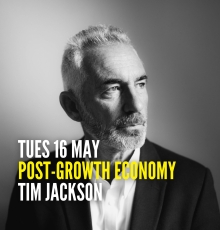Tim Jackson: Imagining a 'post-growth' economy

The good news is that the prevalent economic logic is starting to shift. We've heard it already: exponential economic growth is unsustainable, resources are finite and planetary boundaries should lead decision-making processes. However, politicians, corporations, and economists alike still lead us to believe that our prosperity is intrinsically connected to growing GDP and a buoyant stock market. To provide prosperity for all while respecting planetary boundaries, it is imperative we transcend both the conventional growth-centred worldview and our growth-dependent economic and social systems.
Ecological economist Tim Jackson explores how to get there. Pioneering the potential for a new way of thinking in macroeconomics, Tim conceives of a post-growth economic system that acknowledges the ecological and resource constraints of our planet, and bases prosperity on more than materialistic gains. How do we transform our system and build a ‘post-growth’ economy? Join the conversation.
__________________________________________________________
ABOUT
Tim Jackson is a top ecological economist as well as playwright. He is the director of the Centre for the Understanding of Sustainable Prosperity (CUSP), and Professor of Sustainable Development at the University of Surrey in the UK. He explores the moral, economic and social dimensions of prosperity on a finite planet. He’s served as an advisor on sustainability to numerous commercial, government and intergovernmental organisations. In the early 1990s, he pioneered the concept of preventative environmental management - a core principle of the circular economy framework. Between 2004 and 2011, Tim was Economics Commissioner on the UK Sustainable Development Commission, where his work culminated in the publication of his controversial book Prosperity without Growth. In 2016, he was awarded the Hillary Laureate for exceptional international leadership. In addition to his academic work, Tim is an award-winning dramatist with numerous radio-writing credits for the BBC.








